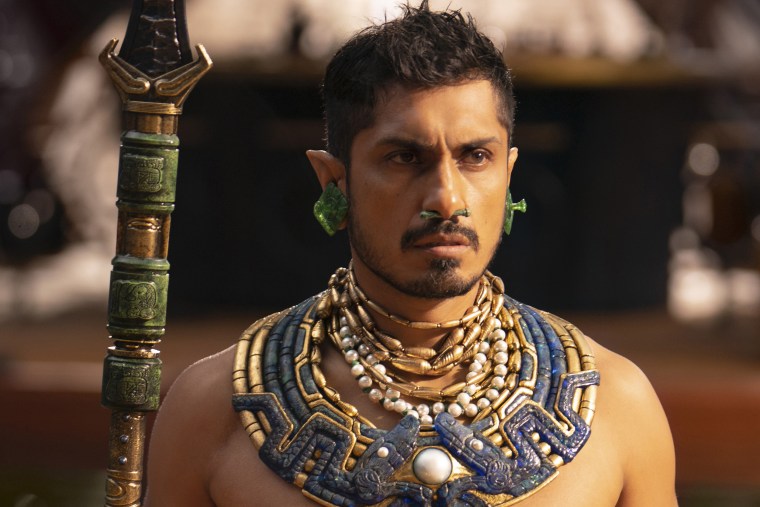Black Panther fans nationwide will head to movie theaters this weekend for the much-awaited sequel and tribute to the iconic African superhero that had been embodied by the late Chadwick Boseman.
But for many Latinos who want to see their own superhero epics on the silver screen, “Black Panther: Wakanda Forever” is a milestone that features Mexican actor Tenoch Huerta, who is now poised to break into mainstream pop culture.
Huerta, who is of Indigenous heritage, plays the mutant leader of a kingdom based on Mayan and Aztec influences, which has thrived beneath the ocean for centuries.
Huerta, whom audiences may know from his roles in the Netflix series "Narcos: Mexico" and the movie "The Forever Purge," told NBC News that the new film is a big step for diversity in Latino culture.
"In Latin America, especially Mexico, we have a lack of representation," he said. TV in Mexico looks "like a Scandinavian country," he said, adding that "all the people" are white on TV or in the ads one sees on the street.
When a company like Marvel Studios — and its parent company Disney — tell a diverse superhero story that focuses primarily on Black and Indigenous characters from East Africa and Mesoamerica — which stretches from modern-day south-central Mexico to Costa Rica — it shows "the rest of the world that representation matters," Huerta said.
On screen, Huerta plays Namor, one of Marvel’s oldest characters, a mutant with pointed ears, winged ankles and superhuman strength that can rival the might of other larger-than-life Marvel characters like Thor.
"When they decide to give this background to Namor, you know, this new background — Mesoamerican culture, especially Mayan culture — I think they nailed it," Huerta said. "Because it’s the right moment to do it in a way, on one hand, and on the other hand, it's important for many people, especially kids. It’s a way to say, ‘Eh, there’s nothing wrong on you. You should be proud of who you are. And the melanin in your skin ... it’s OK and it’s beautiful.’”
Some fans may connect with Namor’s vulnerabilities as an outsider caught between two worlds — the surface one that belongs to humans and Talokan, the underwater kingdom created by his Indigenous people. Talokan is influenced by the Aztec paradise Tlālōcān, which is ruled by the Aztec rain god Tlālōc.
In many ways, Talokan is the mirror image of Wakanda on the surface. Both are powerful kingdoms that have flourished in secrecy. Both are the only known sources on the planet for the fictional metal vibranium, which has an extraordinary ability to absorb, store and release kinetic energy. And both are acutely aware of the racial injustices that have marginalized other diverse peoples in the outside world. But while Wakanda was never colonized, Talokan was created as a refuge by Indigenous survivors who escaped from the horrors of Spanish colonization in Yucatán, Mexico.
The first Black Panther movie was a groundbreaking blockbuster in 2018 that not only focused primarily on Black characters, but also proved that mainstream audiences wanted to see more diversity in film. As Huerta said, "Economically, it works as well."
“Black Panther” grossed almost $1.35 billion worldwide, with 52% of that box office (just over $700 million) earned in the U.S. This adds up to nearly half of the box office brought in by the top-grossing superhero film, “Avengers: Endgame,” (almost $2.8 billion worldwide). “Black Panther” narrowly beat mainstream classics like “Star Wars: Episode VIII — The Last Jedi” (just over $1.33 billion), “Frozen” (nearly $1.31 billion) and “The Lord of the Rings: The Return of the King” (just under $1.15 billion).
“Black Panther: Wakanda Forever” pits both kingdoms — Wakanda and Talokan — against each other as the outside world plots to tap into their exclusive reserves of vibranium.
But Huerta hopes that the proud stories of “brown and Black” peoples will inspire viewers to come together.
“Specially right now, we need to identify with each other and embrace each other,” he said. “You know, just keep going.”
Follow NBC Latino on Facebook, Twitter and Instagram.
